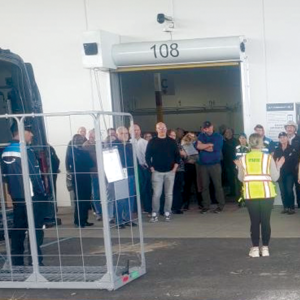By Evelyn Pyburn
Starting a boat business in Montana may not seem like an inherently good idea at first glance, but then maybe you aren’t as passionate about water sports as are Nate and Lindsey Romain, and maybe you haven’t recognized that there is generally a lack of sales and service support in Montana for such enthusiasts.
Those two life experiences eventually prompted Nate and Lindsey to take the plunge and start their own business in Billings in 2023, called Montana Wake Co. They opened in a 3000 sq. ft. building with one employee.
So far it is proving to have been a good move.
In 2024 they serviced over 400 customers and sold over 70 boats and were being asked to deliver and service many more. “The shop was packed to the gills” said Nate, and they had 15 boats in storage and 8 at his home.
The key to their rapid success believes Nate, is their focus on customers. “We listen to the public,” he said, explaining that many boating enthusiasts have had the same experience he did in finding it hard to get the guidance and support needed. After buying his first boat, Nate said, the closest support business was in Kalispell.
Filling that niche has brought customers to the door of Montana Wake very quickly.
In trying to find a new location, the Romains encountered an offer for a building that had previously served a steel business at 7510 Entry Way Drive. The location offered a warehouse much bigger than the Romains had initially considered necessary. At first the building seemed to be “just a pipedream,” but as they looked at it and pondered its potential, Nate said, they began to realize, that even though it was bigger than anticipated, “if we didn’t get it, it would only be a matter of months and we would have to move again.”
So they bit the bullet and forged ahead. With a crew of helpers they worked for three, 20-hour days, getting it into shape. One exciting aspect of the huge building is that they can keep all their boats – new and used – inside, making it easy for customers to inspect them and ponder their choices without having to “brush the snow off,” said Nate. They opened in their new location in October 2024.
“As we moved into the building, we knew we were going to have to really step up our game to make it work,” said Nate – and that they have.
Just a couple months ago, at the Marine Retailers Association of the Americas in Orlando, Florida – the largest marine dealer group in the world — the Romains were recognized with three awards from Centurion, including “Rookie of the Year.”
Centurion (what Nate calls the “Bentley of boats”), is one of several lines of boats Montana Wake carries. Others include Supreme, Bennington and Balise Pontoons. Montanans, said Nate, really enjoy pontoons. For those who are novices about boats, a “wake” boat is one that is used for water sports, such as for water skiing. While there are a few other businesses in the area that sell boats, they mostly focus on boats designed for fishing.
Because Montana Wake focuses so much on support and service for their customers, Nate said that in a sense, they don’t have much competition. It was after all, that lack of such support and service that inspired the Romains to start their business.
Nate’s love of water sports began at a very young age. Although he lived on a ranch between Chester and Fort Benton, he was able to spend summers with his grandparents who lived on Flathead Lake. That’s where he learned to love everything that had to do with water.
“I didn’t want to do anything else,” said Nate.
When circumstances required that they move to Billings, he missed summers on the Flathead, but then discovered Yellowtail Dam and Big Horn Lake and fell in love all over again.
Nate went to work in the oil business and saved up quickly to buy his first boat. Lindsey played a role in that experience, even though they weren’t married yet, but they had discovered they had a mutual passion for water sports.
They soon married and spent all the time they could on the water – exploring other lakes in Montana. Montana’s lakes are scattered but they are often close enough that it’s possible to spend a day on the water and still be home for the evening, pointed out Nate.
The Romains now have a son and a daughter, ages 11 and 7, and all their family time is spent on a lake. “They love the water as much as we do,” said Nate.
In order to pursue their sport, Nate became self- taught, acquiring and using his own equipment. He helped out friends, and he and Lindsay have forged many friendships and relationships, introducing others to the joys of water sports. That grew even more so when they started a Facebook page, which was really the beginning of Montana Wake.
The Romains designed a logo and began selling apparel for boating with the logo (all of it made in Billings). It became very popular, said Nate. They were getting orders from all over the world, such as Africa and Australia. People liked the “Montana stamp on it, and wanted to support us.”
Nate’s reputation for knowledge and expertise about boating began to spread, and he was frequently called upon by people seeking advice or needing help. The Romains would often take people out on excursions, introducing them to water sports and to Montana lakes. There are actually more lake options around the Billings area than people commonly realize. Yellowtail , Houser, Coney, Deadman’s Basin, Canyon Ferry and even Flathead Lake. There’s no need to spend lots of money on extended vacations, points out Nate, there is plenty of places to go not too far down the road.
For the Romains it was still all about “just wanting to get people out to enjoy all the beauty of Montana.” Encouraging them to start a business were requests for demonstrations and charters. “The business started picking up from there.” The fact that Nate found himself often referring people to dealerships was also a signal that here was a business opportunity.
Another, instance of encouragement was when he was approached by a local boat dealership who asked him for assistance. He started subcontracting his services, and was soon working full time as a salesman for the business. But as a salesman, “I wasn’t able to deliver the full experience to the customer, as I wished I could,” he said.
Starting the business was a challenge. Nate said they learned a lot very quickly about dealerships, licensing, insurance, zoning, getting financial backing and floor financing. “We were running into issue after issue.” At times “they were so overwhelming, we thought it was the end of it.”
“But what really kept us going was the public support. That is what drove us and kept us moving forward.”
Currently, the Romains employ 13 people, which include a nephew and his wife who moved to Billings from Michigan – so Montana Wake is truly a family business.
“We are getting employees who love to solve problems,” said Nate, about his staff.
As they have expanded, drawing more interest from adventurists seeking new experiences, they have acquired rental properties on lakes, which allow them to offer get-away packages for their customers.
In all that they find themselves doing, the Romains declare, “We are taking the pain out of having fun.”






